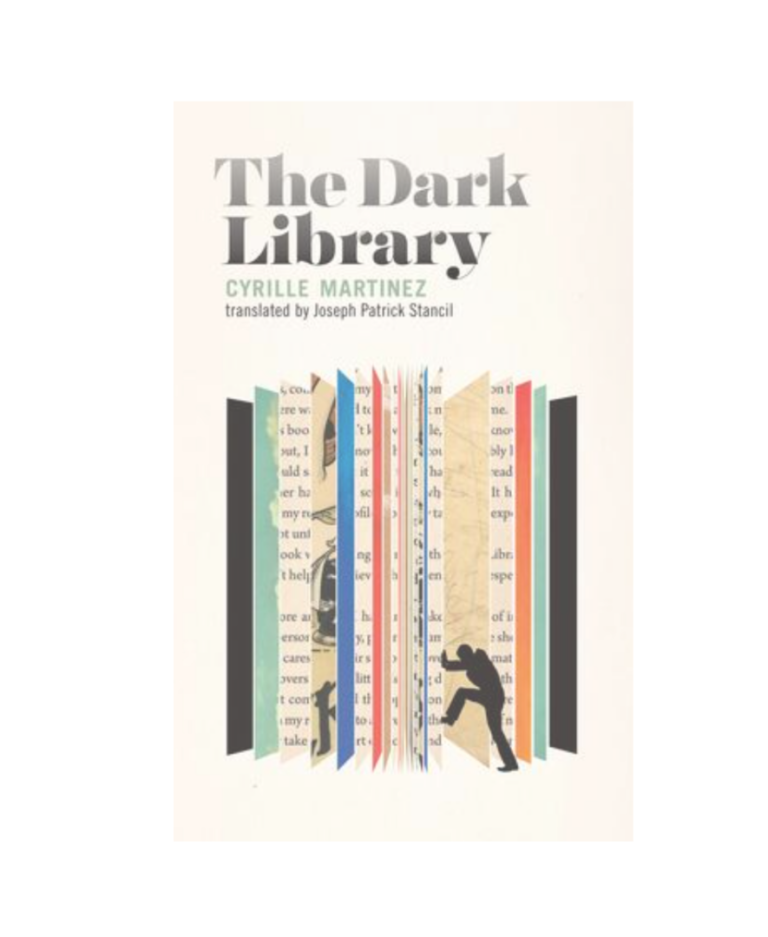Review of The Dark Library
Coach House Books. 2020. 160 pages.
Reading Cyrille Martinez’s The Dark Library feels like watching a documentary on climate change. As a reader, I felt confused, and as a lover of libraries, I felt ashamed, guilty, and scared. Martinez’s ability to easily engender so many emotions in readers is stunning.
The Dark Library begins with an unnamed narrator meeting a novel, The Angry Young Book, who describes the ways in which the visitors of The Great Library no longer care to read, and are only there to socialize and browse their electronics aimlessly. The novel is written in three parts, with each part narrated by a different voice: an unnamed narrator, The Angry Young Book, and The Red Librarian. Through these perspectives, readers see the downfall of The Great Library. The books instate a rule that says anyone in the reading room must read; within hours the library has no guests. From there, Contractual Readers are hired to transfer all of the library’s texts into a PDF.
It sounds far-fetched, the idea of millions of texts being placed into one PDF. Rather than approaching the shelves of a library and searching for an author’s name, we could simply use control+f on our keyboards. No longer is the library’s collection of works personal, rather it is mechanical and cold. Yet, when we think of it, is Martinez creating an alternate reality for readers, or is his apparent fear mongering only representative of our present reality?
In the novel, The Great Library, or rather its paper inhabitants, are personified in their fight against the digitization of their home. They become sickly, with Martinez writing that the narrator places their hand on the cover “like a sick forehead.” When the book is asked if it’s okay, it replies that it will be once it’s read. Readers also get a sense of the fear the books feel. The visitors’ lack of reading has driven the library to clear out a large section of its books. The Angry Young Book explains, “The young books like me were condemned to death.”
Martinez humanizes the books as a way of tapping into readers’ empathy. By creating a character that we feel bad for, he fuels our anger at The Great Library, and at ourselves. Although this is a work of literary fiction, Martinez crafts the novel in a way that is not dissimilar to rhetoric, placing readers in the perfect spot for him to present his argument.
Martinez’s use of unique perspectives only furthers the emotion in the story. He could have easily written the book from the point of view of the library’s Director or a reader. Rather, Martinez chooses to narrate the story from the point of view of a book and a librarian, showing readers what happens to those whose entire life revolves around the library.
Initially, Martinez seems to be arguing that readers should begin to protect libraries from digitization. He describes the physical pain of the books being forgotten – they burn and writhe in agony as their home becomes obsolete. The only source of hope, it seems, is a return to the Middle Ages.
Despite this negative perspective, I don’t think Martinez believes that libraries are to be gatekept by readers. He is only attempting to scratch the surface of what will happen to libraries if we continue to fight against their digital shift. If libraries don’t change, he suggests, they will fail, and it will be the fault of readers. Martinez asks the reader: if we love libraries the way we claim to, would we not want them to thrive?
As I step out of the alternate universe Martinez has created, I question how alternate it really is. If I walked into a library tomorrow and picked up a book, would that book have known I was coming? If I walked into the reading room and sat down to read, would I be angry that I could hear the click of people typing? If so, would I be surprised when it all disappeared, when I lost the library I love so much, or would I realize that it was all my fault to begin with?

